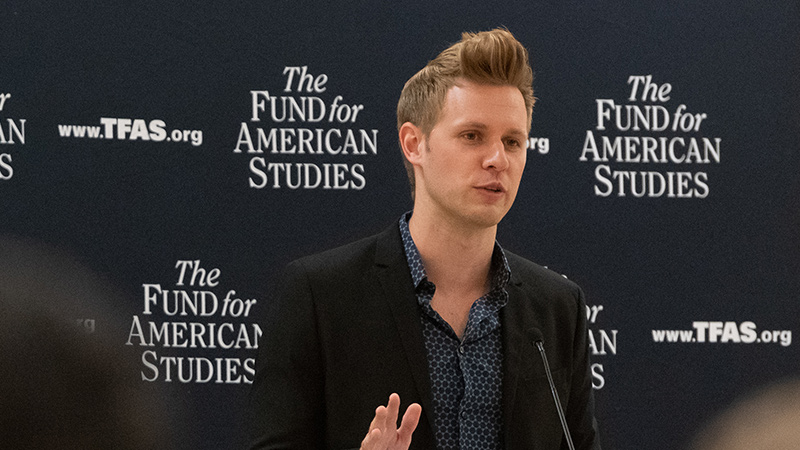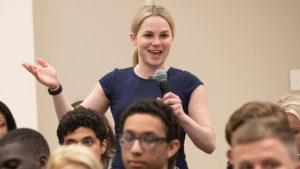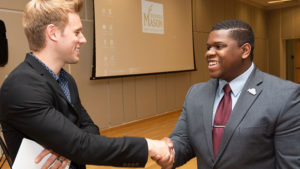
When debate dies, who loses? Robby Soave (Novak 17), associate editor at Reason.com and 2017 TFAS Robert Novak Journalism Fellow, tackled this question during the first TFAS all-institute lecture of our 2018 U.S. Summer Programs. Pulling from his experience as a journalist covering higher education, the history of free expression throughout the world and its central role to democracy, Soave made the argument that free speech is not only in crisis on our college campuses but that there is also reason for concern beyond the gates of our universities.

“The threat to free speech on campuses is a problem for a society that seeks to resolve its differences through peace, through reasoned discourse and to overcome differences without resorting to violence,” said Soave.
Free speech and the right to express yourself without fear of formal reprisal from authority is a fairly recent phenomenon of human history pointed out Soave, only becoming a norm over the last two to three hundred years during the Age of Enlightenment. Prior to the 18th century, it was very common to arrest, torture or kill people for having said something that offended the religious or political authorities of a society.
The threat to free speech on campuses is a problem for a society that seeks to resolve its differences through peace, through reasoned discourse and to overcome differences without resorting to violence.” – Robby Soave (Novak 17)
“These Enlightenment principles are the backbone of American democracy and American tolerance,” said Soave. “One of our own founders, Thomas Jefferson, said that it was more important to have free speech than to have democracy at all. He said that if he could only have democracy or he could only have had newspapers, he would rather only have newspapers because a society without some ability to criticize the government, even if it was a free society to begin with, would not remain free unless you had that mechanism.”

Soave told students how this belief that our better ideas can overcome bad ideas became an ethos on college campuses in the 1960s when student leaders at the University of California Berkeley rebelled against campus censorship.
“I do not think this ethos has gone extinct on college campuses, but if any of you have been paying attention to the headlines in the last couple of years, it certainly seems to me this ethos is a little bit under threat at least on many of the most elite liberal arts college campuses in the country,” said Soave. “I’ve been covering these issues for four years and they’ve become incidents where people try to speak on campus and are shut down, sometimes by the administration, but often at the behest of students who believe the speaker using their free speech rights is somehow a threat to them.”
Soave was at the University of Michigan in 2017 when economist Charles Murray came to speak and was immediately met with students trying to shut him down. Soave noted that many students wanted to hear what Murray had to say and asked some questions to challenge him. “It was totally productive and totally in keeping with the kind of atmosphere that should take place on college campuses,” said Soave. “But some of the students shouted over him. They claimed that he was a threat to their safety.”
I think that it’s up to us – now that we are introduced to this problem, now that we’re aware of it – that when we go back to campus to spread this message that free speech is important and should be defended and is really vital to intellectual development on campus.” – Talia Katz (IEIA 18)
Soave’s words struck special meaning for 2018 TFAS Leadership Scholar Talia Katz (IEIA 18), who found herself in the middle of a free speech controversy on her campus when she penned an opinion piece for her student newspaper. As a public policy major at The Univesity of Michigan, Katz said, “I noticed that the right side of politics was totally shunned out of the conversation or demonized in some way. I really thought that was a problem because we should be talking about all different perspectives about issues.”
Katz’s article suggested that students of all political perspectives should be able to express their views. The article received some positive feedback from faculty and created a degree of change, but Katz said she continues to receive backlash from some of her peers. “I will say that now it’s on people’s radars, which I think is important,” she said.
Through Soave’s lecture, Katz said she learned that freedom of expression and the right to hear diverse opinions is a larger problem than she realized. “I think that it’s up to us – now that we are introduced to this problem, now that we’re aware of it – that when we go back to campus to spread this message that free speech is important and should be defended and is really vital to intellectual development on campus.”
To students who support free speech in theory, but worry about ideas that are offensive or denigrating to marginalized groups, Soave said extending free speech rights to even seemingly pointless or deeply offensive speech is essential to protecting our most vulnerable groups in the long run. “If we restrict their free speech rights, ours could be next … young people who are skeptical that free speech is a good thing should think very seriously about what kind of speech would be restricted if we got rid of this norm and gave the authority more power to police offensive views.”
In addition to his coverage of higher education, Soave reports for Reason.com on criminal justice reform and television. He is also a columnist for The Daily Beast and has penned articles for The New York Times, New York Post, CNN, USA Today, U.S. News & World Report, Newsweek, The Orange County Register and The Detroit News. Forbes named him to the 2016 “30 Under 30” list in the category of law and policy.
For the second consecutive summer, TFAS has made free speech and intellectual diversity a central theme of our U.S. Summer Programs in Washington, D.C. Following last summer’s programs, 96 percent of students reported that they had a better understanding of their First Amendment rights and 87 percent said they were more open toward ideas they disagreed with. To learn more and see the impact of TFAS programs, please visit www.TeachingFreedom.org/Impact.

